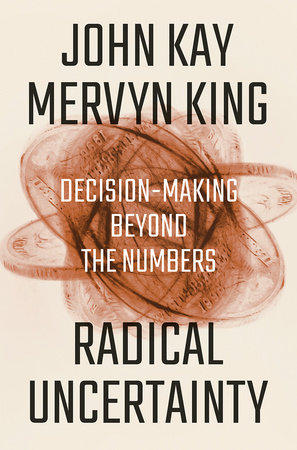Decision-Making Beyond the Numbers
The question ‘What is going on here?’ sounds banal, but it is not. In our careers we have seen repeatedly how people immersed in technicalities, engaged in day-to-day preoccupations, have failed to stand back and ask, ‘What is going on here?’ We have often made that mistake ourselves.This is precisely the question that Mervyn King and John Kay pose in their new book Radical Uncertainty. Terrific reading for lockdown days. Below, I've selected some statements:
The difference between risk and uncertainty was the subject of lively debate in the inter-war period. Two great economists – Frank Knight in Chicago and John Maynard Keynes in Cambridge, England – argued forcefully for the continued importance of the distinction. Knight observed that ‘a measurable uncertainty, or “risk” proper, as we shall use the term, is so far different from an unmeasurable one that it is not in effect an uncertainty at all’
The title of this book, and its central concept, is radical uncertainty . Uncertainty is the result of our incomplete knowledge of the world, or about the connection between our present actions and their future outcomes. Depending on the nature of the uncertainty, such incomplete knowledge may be distressing or pleasurable. I am fearful of the sentence the judge will impose, but look forward to new experiences on my forthcoming holiday. We might sometimes wish we had perfect foresight, so that nothing the future might hold could surprise us, but a little reflection will tell us that such a world would be a dull place.
We have chosen to replace the distinction between risk and uncertainty deployed by Knight and Keynes with a distinction between resolvable and radical uncertainty. Resolvable uncertainty is uncertainty which can be removed by looking something up (I am uncertain which city is the capital of Pennsylvania) or which can be represented by a known probability distribution of outcomes (the spin of a roulette wheel). With radical uncertainty, however, there is no similar means of resolving the uncertainty – we simply do not know. Radical uncertainty has many dimensions: obscurity; ignorance; vagueness; ambiguity; ill-defined problems; and a lack of information that in some cases but not all we might hope to rectify at a future date. These aspects of uncertainty are the stuff of everyday experience.
Radical uncertainty cannot be described in the probabilistic terms applicable to a game of chance. It is not just that we do not know what will happen. We often do not even know the kinds of things that might happen.
Our ability as humans to deal with radical uncertainty is the product of our much greater capacity for social learning and greater ability to communicate relative to other species. We are social animals; we manage radical uncertainty in a context determined by the knowledge we have acquired through education and experience, and we make important decisions in conjunction with others – friends, family, colleagues and advisers.
Reference to the ‘wisdom of crowds’ makes an important point while missing another. The crowd always knows more than any individual, but what is valuable is the aggregate of its knowledge, not the average of its knowledge.
